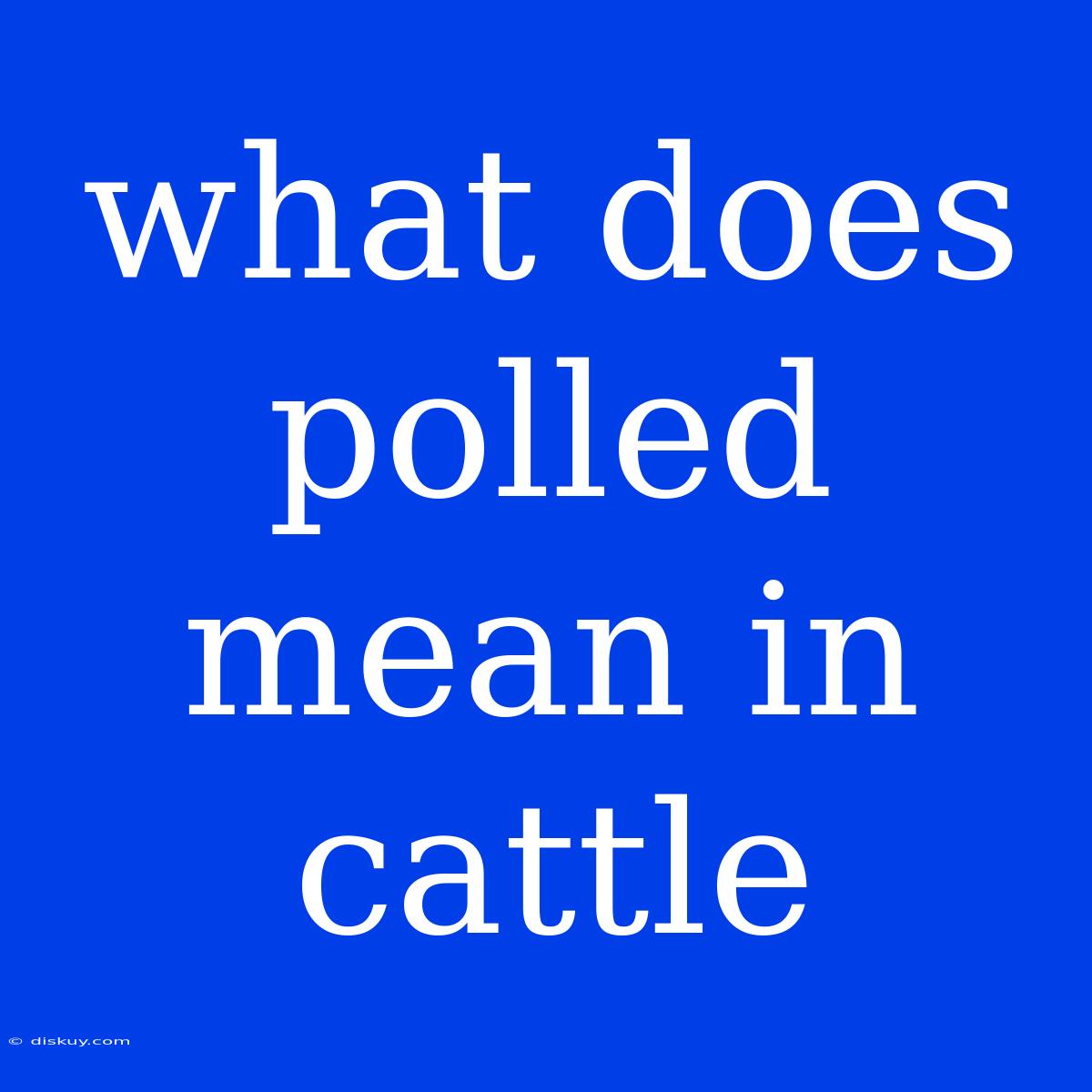What Does Polled Mean in Cattle? Unlocking the Mystery of Hornless Bovines
What exactly does "polled" mean in cattle, and why is it significant? Polled cattle are simply cattle that have been genetically bred to be naturally hornless. This might seem like a minor detail, but it carries crucial implications for both farmers and the well-being of the animals themselves.
Editor Note: Polled cattle are becoming increasingly popular in the beef and dairy industries for a multitude of reasons. This article delves into the fascinating world of polled cattle, exploring their genetic origins, benefits, and the growing trend of hornlessness in the modern cattle industry.
Why should you care about polled cattle? Understanding the meaning of "polled" and the advantages it offers can provide valuable insights into modern cattle breeding practices and the overall health and safety of the industry. This article aims to clarify the significance of this trait, its impact on cattle management, and the future of hornless cattle.
Our analysis involves exploring historical breeding practices, examining the genetic basis of polledness, and analyzing the advantages and potential drawbacks of hornless cattle. We've gathered information from reputable sources, including agricultural journals, industry reports, and expert opinions, to provide a comprehensive understanding of this important characteristic in cattle.
Key Takeaways of Polled Cattle:
| Feature | Description |
|---|---|
| Genetic Origin | The polled trait is a dominant gene, meaning a single copy of the gene is enough to produce hornless offspring. |
| Benefits | Increased safety for farmers and other livestock, reduced stress for cattle, and potential economic advantages due to increased productivity. |
| Impact on Breeding | Selective breeding for the polled trait has significantly increased the number of hornless cattle in modern herds. |
Let's explore the key aspects of "polled" in cattle:
Polled Cattle: The Rise of Hornless Bovines
The absence of horns in cattle is not a recent phenomenon. Naturally polled breeds have existed for centuries, with selective breeding further solidifying the trait. Today, the polled gene is widespread, influencing most major beef and dairy breeds. The dominance of the polled gene allows for the easy propagation of hornless cattle through controlled breeding practices.
The Advantages of Polled Cattle
The absence of horns provides several advantages:
1. Improved Safety:
- Reduced risk of injuries: Hornless cattle are much safer for farmers and other livestock, decreasing the chances of goring or head-butting injuries.
- Enhanced handling: Polled cattle are generally calmer and easier to handle, reducing the risk of accidents during routine management tasks.
2. Increased Animal Welfare:
- Reduced stress: The absence of horns eliminates a natural source of anxiety and aggression, leading to a more relaxed and comfortable environment for cattle.
- Less competition: Hornless cows are less prone to injuries during social interactions, ensuring a healthier and less stressful herd environment.
3. Potential Economic Advantages:
- Higher productivity: Reduced stress translates to better feed conversion and milk production in dairy cows, potentially leading to increased economic returns.
- Lower veterinary costs: Fewer injuries mean fewer veterinary bills, ultimately contributing to a more profitable operation.
Addressing Potential Drawbacks
While the benefits of polled cattle are significant, a few potential drawbacks exist:
- Genetic Variation: The prevalence of the polled gene may lead to reduced genetic diversity within specific breeds.
- Environmental Adaptation: Some speculate that hornless cattle might be more susceptible to certain environmental conditions, but this remains largely unsubstantiated.
Frequently Asked Questions About Polled Cattle
Q: Are all polled cattle the same breed?
A: No. Polledness is a trait that exists across various cattle breeds.
Q: How can I tell if a cow is polled?
A: The absence of horns is the most obvious indicator. However, some cattle may have very small horn buds that are almost invisible.
Q: Can polled cattle develop horns later in life?
A: No, if a cow is polled, it will remain hornless throughout its lifetime.
Q: Is it safe to handle polled cattle?
A: Polled cattle are generally safer to handle than horned cattle, as they pose a reduced risk of injuries. However, it's essential to always exercise caution when interacting with any livestock.
Q: Are there any disadvantages to breeding for polled cattle?
A: As mentioned above, there are potential drawbacks, such as reduced genetic diversity and potential environmental concerns. However, the benefits of polledness generally outweigh these potential risks.
Tips for Raising Polled Cattle
- Select reputable breeders: Choose breeders who prioritize polled genetics and animal welfare.
- Understand breed characteristics: Be familiar with the specific characteristics of the breed you are interested in, including their polledness tendencies.
- Practice safe handling: Always exercise caution and follow proper animal handling procedures.
- Monitor herd health: Keep a close eye on your herd's overall health and address any potential issues promptly.
Summary: Unlocking the Benefits of Hornlessness
The prevalence of polled cattle in modern agriculture is a testament to the significant advantages of hornlessness. From improved safety and increased animal welfare to potential economic benefits, the absence of horns has transformed cattle farming practices for the better.
By understanding the meaning of "polled" and recognizing the impact of this trait, farmers can make informed decisions about breeding practices and ensure the well-being of their herds. As the cattle industry continues to evolve, the dominance of the polled gene is likely to continue, ushering in a new era of hornless cattle and a safer, more efficient livestock sector.

